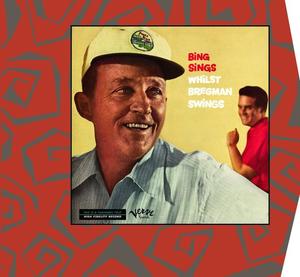
Bing Sings Whilst Bregman Swings
conducted by Buddy Bregman; performed by Bing Crosby, 1903-1977, Milt Bernhart, Pete Candoli, 1923-2008, Bob Cooper, 1925-1993, Harry Edison, 1915-1999, Maynard Ferguson, 1928-2006, Herb Geller, 1928-2013, Chuck Gentry, Conrad Gozzo, 1922-1964, Barney Kessel, 1923-2004, Ted Nash, 1960-, Frank Rosolino, 1926-1978, George Roberts, Paul Smith, 1906-1985, Alvin Stoller, 1925-1992 and Bud Shank, 1926-2009, Buddy Bregman Orchestra (Verve Records, 2001), 37 mins
Details
- Field of Interest
- Jazz
- Conductor
- Buddy Bregman
- Content Type
- Music recording
- Duration
- 37 mins
- Ensemble
- Buddy Bregman Orchestra
- Format
- Audio
- Sub Genre
- Piece, Vocal Jazz
- Label
- Verve Records
- Performer
- Bing Crosby, 1903-1977, Milt Bernhart, Pete Candoli, 1923-2008, Bob Cooper, 1925-1993, Harry Edison, 1915-1999, Maynard Ferguson, 1928-2006, Herb Geller, 1928-2013, Chuck Gentry, Conrad Gozzo, 1922-1964, Barney Kessel, 1923-2004, Ted Nash, 1960-, Frank Rosolino, 1926-1978, George Roberts, Paul Smith, 1906-1985, Alvin Stoller, 1925-1992, Bud Shank, 1926-2009
- UPC (Physical)
- 00731454936729
- Date Recorded
- 1956-06-11
- Release Date
- 2001-03-13
- Review
- In early 1956, Bing Crosby ended the two long-term company affiliations that had defined his career for more than 20 years, leaving his exclusive associations with Paramount Pictures and Decca Records. Thereafter, he made movies and records on a freelance basis. The immediate results were more felicitous for his film work than his recording, as he went to MGM for the successful movie {#High Society}. As a recording artist, in rapid succession he cut the movie soundtrack for Capitol (January-February); a new album for Decca, Songs I Wish I Had Sung (The First Time Around) (April); and a new album for Verve, Bing Sings Whilst Bregman Swings (June). The third was the least likely. Twenty-five-year-old Buddy Bregman, a friend of Crosby's son Gary, had recently been appointed an A&R executive at the fledgling Verve. His idea for Crosby was to copy the formula of recent Nelson Riddle-arranged Frank Sinatra successes such as Songs for Swingin' Lovers -- take a collection of inter-war standards and give them punchy big-band arrangements. The approach was well-suited to the aggressive Sinatra, who wasn't shy about editing the arrangements himself, but singularly inappropriate to the affable Crosby, who left everything to his arranger/conductor. The 12 songs, none of which Crosby had released commercially before, were great standards from the likes of Kern, Rodgers and Hart, Berlin, and Gershwin, and Crosby turned in typically witty interpretations. But Bregman's repetitive, overly busy arrangements, full of loud, sudden horn blats and splats, forced the singer to compete for attention and occasionally smothered him completely. Crosby was looking for a way back to commercial appeal with this experiment. But the three albums were all released within a period of weeks in August and September, and only the film soundtrack got a fair hearing and became a hit. ~ William Ruhlmann, All Music Guide
- Subject
- Jazz, Music & Performing Arts, Vocal Jazz, Jazz Vocal
- Keywords and Translated Subjects
- Jazz Vocal
